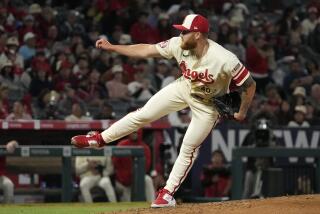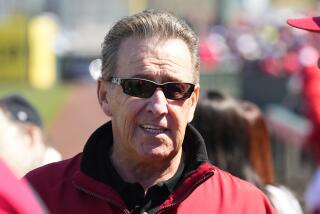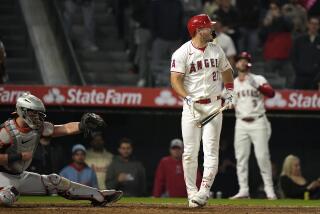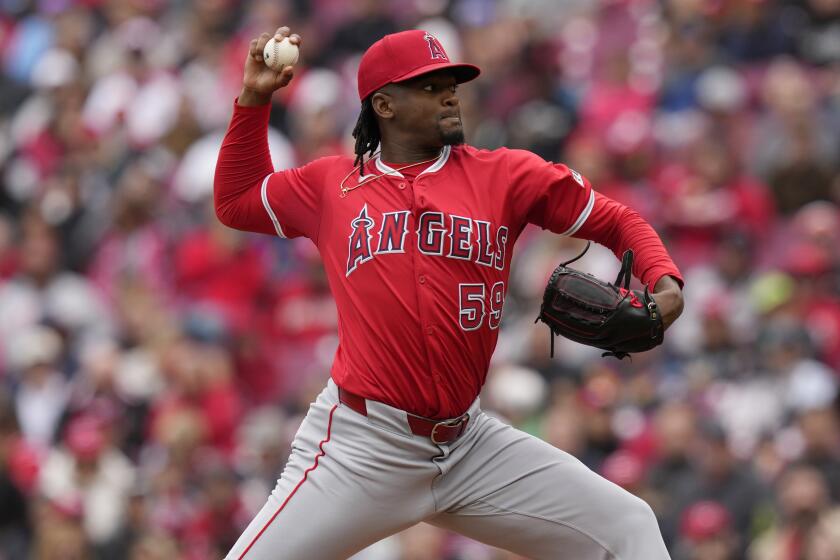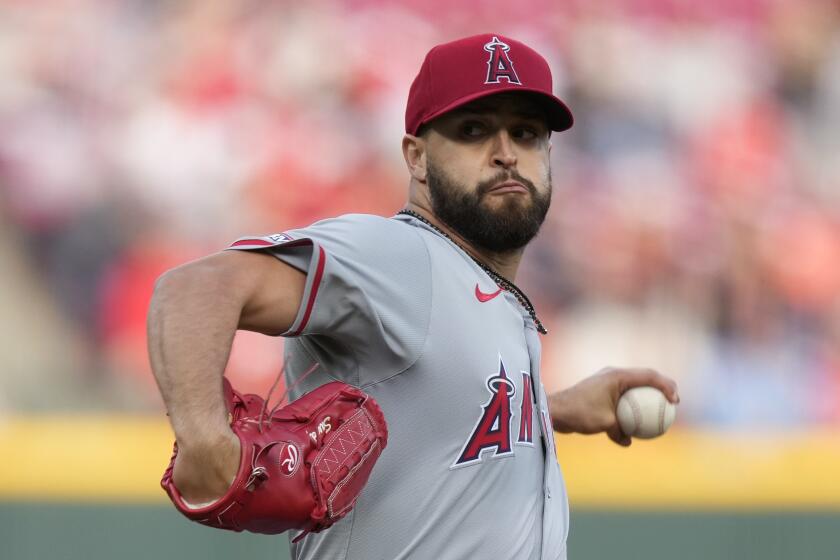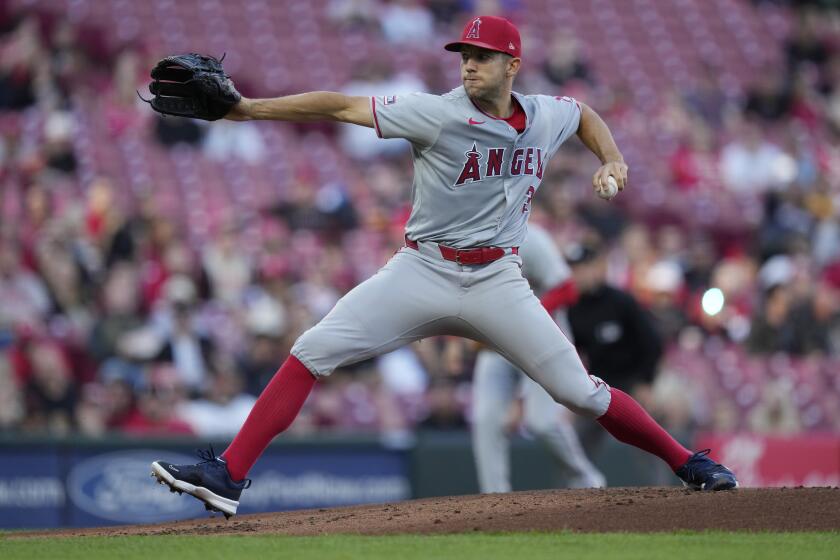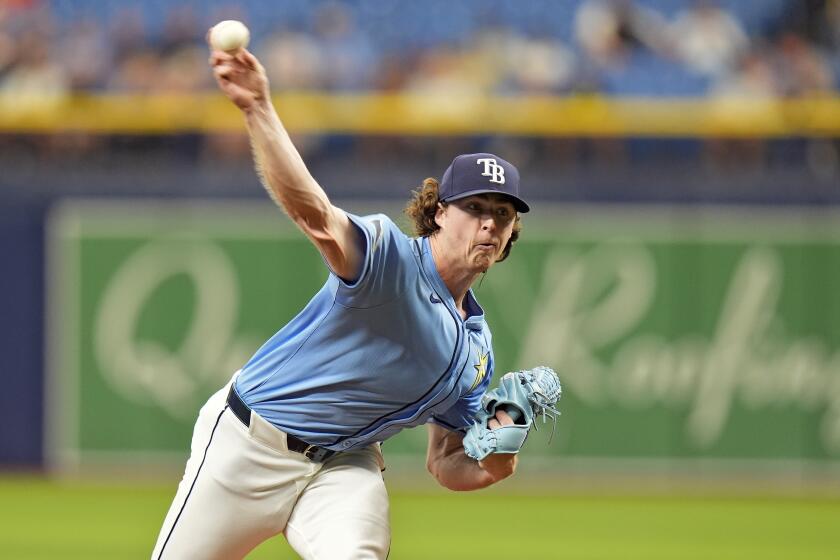Short Story for Angels
The Angels staged a baseball blitzkrieg Monday, swooping in with virtually no warning, nabbing free-agent shortstop Orlando Cabrera with a four-year, $32-million contract and severing ties with one of the franchise’s most popular players, overachieving shortstop David Eckstein.
In a stunning span of about eight hours, the Angels initiated -- and consummated -- negotiations with Cabrera, the 30-year-old defensive whiz who was a key force in the Boston Red Sox’s 2004 World Series run, and chose not to offer arbitration to Eckstein, the team’s inspirational leadoff batter since 2001.
“We think this guy is an upgrade talent-wise, both offensively and defensively, and we’re glad to have him,” Angel General Manager Bill Stoneman said of Cabrera.
“At the same time, it’s a sad day, because we’re going to miss David Eckstein.... From an emotional standpoint, a lot of fans may not care for this move until they get an opportunity to see Cabrera play.”
Few saw Cabrera play from 1998 through last July because the Colombia native played his first seven big league seasons in Montreal.
But Cabrera became more of a household name after being traded to the Red Sox on July 31, taking over for Boston star Nomar Garciaparra and batting .294 in 58 games with six homers and 31 runs batted in and contributing several dramatic, game-winning hits and near flawless defense.
Numerous Boston players and executives cited Cabrera as the glue to the team’s defense and the spark that helped ignite the Red Sox to baseball’s best record (42-18) from Aug. 1 on. Cabrera was also solid in the post-season, hitting .288 (17 for 59) with 11 RBIs in 14 games.
A career .268 hitter, Cabrera, who was also courted by St. Louis and Seattle, is a bit of a free swinger who doesn’t draw many walks -- he has a mediocre .316 career on-base percentage -- but he also doesn’t strike out much.
He had 14 homers, 41 doubles and 96 RBIs in 2001 and 17 homers, 47 doubles and 80 RBIs in 2003 for Montreal, and his glove, range and throwing arm are superior.
The Angels showed no interest in Cabrera all winter, focusing their pursuits on a starting pitcher and a center fielder.
Dan Lozano, Cabrera’s agent, called Stoneman in early November, but his attempts to sell the Angels on Cabrera were rebuffed.
Then Monday, Stoneman called Lozano to ask what it would take to sign Cabrera. By early evening, the pair had worked out a deal that includes a $4-million bonus and will pay Cabrera $5 million next season, $6.5 million in 2006, $7.5 million in 2007 and $9 million in 2008.
“We never had any indication the Angels were going to be a team with interest,” Lozano said. “This was literally the craziest day of my career. It was surprising ... but all along, I felt the Angels were a nice fit for Orlando.”
Eckstein, the 5-foot-7, 165-pound shortstop, was a good fit for Anaheim for four years, helping the Angels win the 2002 World Series despite having virtually no power, limited range and a below-average arm. But what Eckstein lacked in physical skills, he made up for with grit.
“He’s been the heart and soul of the team, an inspiration for all of us,” Angel first baseman Darin Erstad said. “There’s no one I’ve seen play the game as hard as him. He’ll go 0 for 25, show up at the stadium the next day and be the happiest guy in the world. He shows up for one reason, to win.”
But Eckstein’s stock began to slide during an injury-plagued 2003, when he hit .252 with 59 runs in 120 games, and a sub-par 2004, when he hit .276 with 92 runs, had a .339 on-base percentage and was demoted from the leadoff spot in September.
Though Stoneman and Manager Mike Scioscia backed their shortstop publicly, support for Eckstein was eroding.
If Eckstein wasn’t igniting the offense as he did in 2002, when he had a .388 on-base percentage, and his defense remained solid but unspectacular, how could the Angels justify keeping him?
When the Angels’ three-year, $23-million offer failed to land Clement, who signed with the Red Sox on Friday, Stoneman decided to use those funds -- and the estimated $3 million Eckstein would have made in arbitration next season -- to upgrade at shortstop.
Chone Figgins, who will start in place of injured second baseman Adam Kennedy next April, is the likely replacement in the leadoff spot.
The Angels, whose 2005 payroll projects to about $95 million, tendered contracts to the rest of their players on the 40-man roster, including pitcher Jarrod Washburn, and Stoneman said the team will probably begin 2005 with a rotation of Bartolo Colon, Kelvim Escobar, Washburn, John Lackey and Paul Byrd.
Eckstein, though, will be elsewhere.
“You kind of knew they might have been looking for a shortstop,” Eckstein said by phone from his home in Florida.
“It definitely hurts. Anaheim was great. Having the opportunity to play in front of those fans for four years ... you expect to play your whole career there, but I guess that’s not in the works.”
Eckstein was plucked off waivers from the Red Sox in 2000 and took advantage of a spring training injury to Kennedy to win the second-base job at the start of 2001.
Eckstein played so well that after Kennedy returned, Scioscia moved Eckstein to shortstop, where he remained for almost four years, batting .278, leading the major leagues in sacrifice hits and hit batsmen in 2001 and 2002.
Fans admired Eckstein for overcoming so many obstacles -- most notably his lack of size -- to reach the big leagues and excel there. Eckstein was active in the community and more than cooperative with the media.
“I need to thank everyone involved in the Angel organization for what they’ve done for me and my family,” said Eckstein, a free agent.
“They gave me the opportunity to play every night, to prove myself even though everyone had doubts about me.
“They stuck behind me for four years, and that changed my life for the better. There’s definitely no hard feelings, whatsoever ... but I’ll definitely miss everyone. That’s where it hurts. You create a bond within the team, the organization, the community. To have it go down like this is tough.”
More to Read
Go beyond the scoreboard
Get the latest on L.A.'s teams in the daily Sports Report newsletter.
You may occasionally receive promotional content from the Los Angeles Times.
